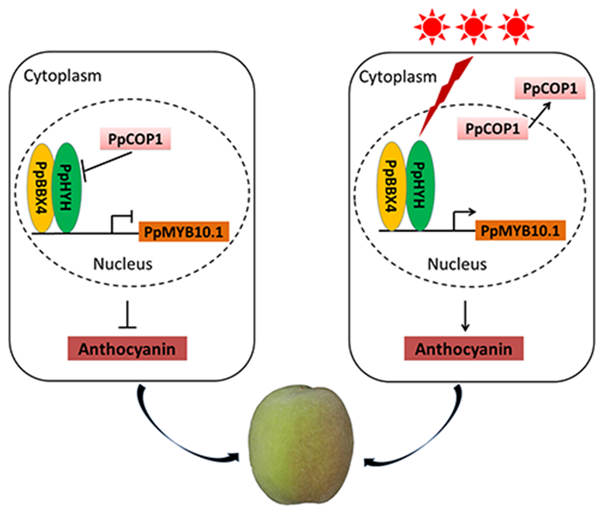
Peach is an economically important fruit tree crop worldwide. As an important appearance quality, its skin coloration affects the commercial value of the fruit. However, how light affects its coloration remains unclear.
Supervised by Prof. HAN Yuepeng from the Wuhan Botanical Garden of the Chinese Academy of Sciences, Ph.D. student ZHAO Lei compared the difference between sun-exposed peel and shaded peel of peach fruit by phenotypic and transcriptome analysis, and an elongated hypocotyl 5-homolog gene PpHYH was found to be a light-response regulator controlling anthocyanin accumulation int fruit peel under light condition.
A series of studies showed that PpHYH promoted the activation of anthocyanin-related genes such as PpMYB10.1s, PpUFGT and PpGST in the present of a cofactor PpBBX4.
In addition, the function of PpHYH was depressed by the gene PpCOP1 (the key repressor of light signaling in darkness), leading to the failure of anthocyanin accumulation in the shaded peel.
This study firstly reveals the PpHYH gene regulates the anthocyanin accumulation in fruits, which is helpful for comprehensive understanding of the complex mechanisms underlying anthocyanin accumulation in peach fruit.
This work was published in Tree Physiology entitled "PpHYH is responsible for light-induced anthocyanin accumulation in fruit peel of Prunus persica."

The regulatory network model for light-induced anthocyanin accumulation in the fruit exocarp of peach. (Image by ZHAO Lei)

86-10-68597521 (day)
86-10-68597289 (night)

52 Sanlihe Rd., Xicheng District,
Beijing, China (100864)

